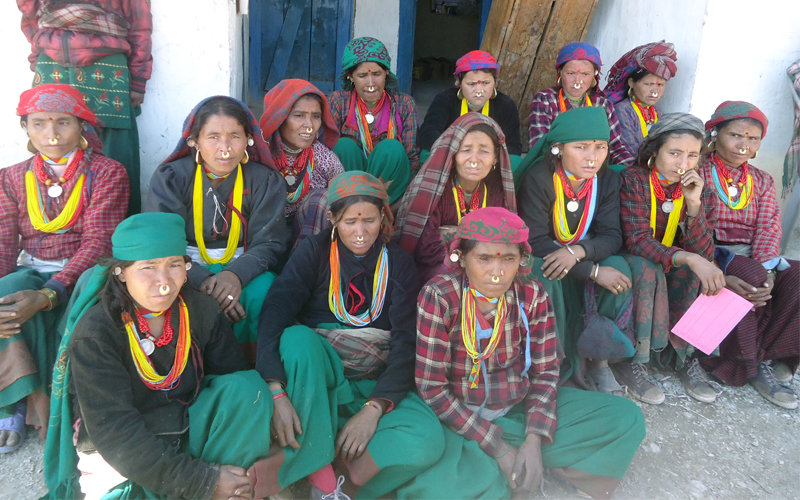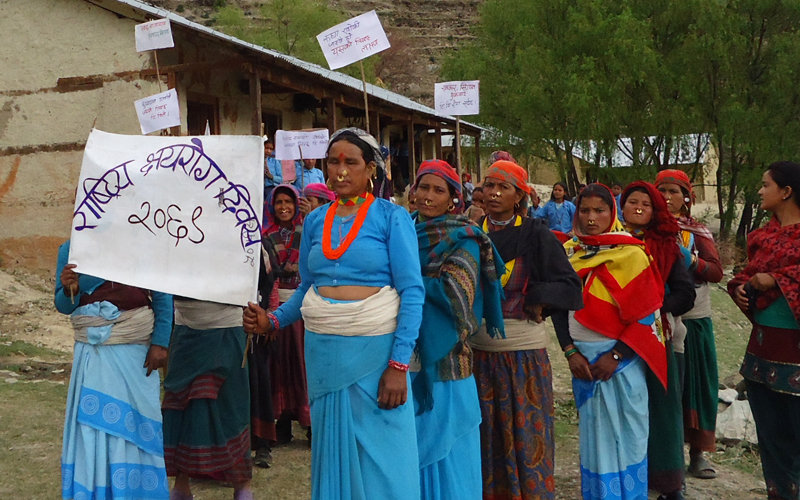By PHASE Team | PHASE Nepal
Sakuntala Jaisi is a 22 year old young mother from Madana, a village approximately 6 hours walk from Maila health post. She had her first baby, a little girl, a few months ago, ably assisted during the birth by the PHASE health workers.
Here, we are not focussing on her delivery, but on the events leading up to and during her early pregnancy, which demonstrate the wide range of problems our health workers deal with:
Sakuntala recalls:
“I come from a poor and remote village, my parents are farmers and my father sometimes goes to Simikot (district headquarter of Humla) to work for a local trekking company, to increase our income. I went to school for 3 years but then dropped out to help my mother with all the chores, looking after the younger children and the animals and working in the house and on the fields. When I was 19 years, my parents arranged a marriage for me with a young man from Madana village, and I moved in with my parents in law. Life was OK with my new family, except that I missed my mother and sisters. But after about a year of married life, my mother in law began to question me every month because I had still not fallen pregnant.
I had not told her – or anyone – that my womb was dropping down and causing me quite a bit of discomfort when walking, and I was worried that this might be the reason that I wasn’t falling pregnant. I tried to keep this from my husband as well, and always pushed my womb in with my hand before we had marital relationships.”
Sakuntala is one of many women in Nepal who suffer from uterine prolapsed. In most countries, this is a problem mostly seen in older women who have had many children, but for reasons still not quite clear (probably related to malnutrition and hard labour), in Nepal even young women can be affected. Uterine prolapsed is not a life threatening condition but can cause discomfort, bleeding and discharge and often women feel very embarrassed about it.
Sakuntala continues:
“After about 2 years of marriage, the pressure to have a baby was getting bigger and bigger and I was getting very worried that my mother in law would ask my husband to take another wife, even though he really loved me and told me he was not worried about me not having children. I had heard that in Maila health post a new organisation, PHASE, had started working and that the health workers there were very good and had helped many people. I decided to go there in spite of my embarrassment about my condition. When there was a group of other people from the village planning to go to Maila for treatment, I joined them, but I was worried that I might have to tell about my problem in front of them, so I thought up an alternative story of headaches and back pain in case I couldn’t speak to the health worker alone.”
Sakuntala needn’t have worried: In all PHASE health projects, great emphasis is placed on patient confidentiality, and the health workers always make sure they see individual patients in a separate room.
Sakuntala described what happened next:
“I was really shy about the story, but when I told them about not having had a child in two years marriage, and the kind sister asked me about other problems, such as my periods or problems with my womb dropping, I told her everything. The sister then examined me – I had to cover my face for embarrassment – and placed a soft ring inside me that kept my womb up. Even on the way home to Madana I felt the relief of the treatment.”
PHASE health workers are all trained in the fitting of rubber ring pessaries, which is the best treatment for young women who still want to have children. Older women might opt to have an operation, but this is not always easily available.
Amazingly (we don’t really have a scientific explanation for this), Sakuntala fell pregnant within 2 months! Her troubles were not over, however:
“One day, about 2 ½ months after I had first missed my period, I noticed that I was having trouble passing urine. It didn’t hurt, but only a few drops seemed to be coming out every time I went, even though I really felt as if my bladder was full. This got worse very quickly and by the next day I was unable to pass any urine and I was in great pain with a swollen abdomen. I told my husband – “there is something very wrong, we must go to the health post in Maila as soon as we can”. – It was a big struggle to get all the way to Maila, I was in so much pain, and the path that usually takes 6 hours to walk took us 9 hours instead. I felt near to fainting many times and just collapsed on the floor outside the clinic when we finally got there. The nurses quickly asked what had happened and realised that something must be blocking my urine from passing out of the bladder. They passed a small tube into my bladder, and although that hurt a little, the relief when the urine came out was great. They advised me and my husband to stay overnight, to make sure that I could pass urine on my own.”
Unfortunately, by the next morning, Sakuntala’s bladder was full again – the growing womb was just exactly the size to fill the whole pelvis and press on the urethra, the small urine vessel from the bladder, and block it. The nurses used a catheter again, but then the question was what to do next? Sakuntala couldn’t stay in Maila, she had work back home, and she couldn’t come back every day to have a catheter – ideally, this needed to be done at least twice a day.
Although the PHASE health workers hadn’t seen such a case before, and hadn’t been told what to do, they came up with the right solution: They taught Sakuntala’s husband how to catheterise her – including how to wash his hands and sterilise the catheter!
Sakuntala takes up the story:
“The nurses very carefully taught my husband how to use the small tube and how to keep it clean so my bladder wouldn’t get infected. I was still quite embarrassed about it all, but it was better than the pain when I couldn’t empty my bladder at all! Luckily, I found after about a week at home that I was suddenly able to pass urine freely again and so we didn’t have to use this treatment very often!”
Once the womb becomes bigger it will push itself out of the pelvis into the abdomen and will then not press on the urethra anymore. If Sakuntala hadn’t had treatment in time, she might well have died of kidney failure in early pregnancy. The presence of the PHASE health workers probably saved both her and her unborn baby’s life, through a very simple intervention which even her husband could do, once he had been taught!
Please help us continue our work in Maila so that women and children can get the health care they need when emergencies like this arise.
Project reports on GlobalGiving are posted directly to globalgiving.org by Project Leaders as they are completed, generally every 3-4 months. To protect the integrity of these documents, GlobalGiving does not alter them; therefore you may find some language or formatting issues.
If you donate to this project or have donated to this project, you can recieve an email when this project posts a report. You can also subscribe for reports without donating.
Support this important cause by creating a personalized fundraising page.
Start a Fundraiser
